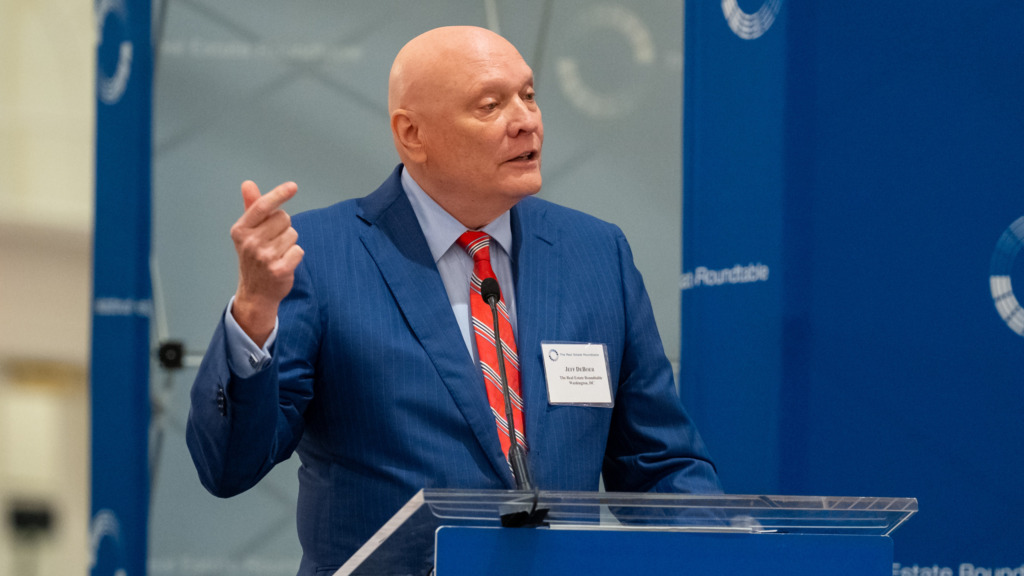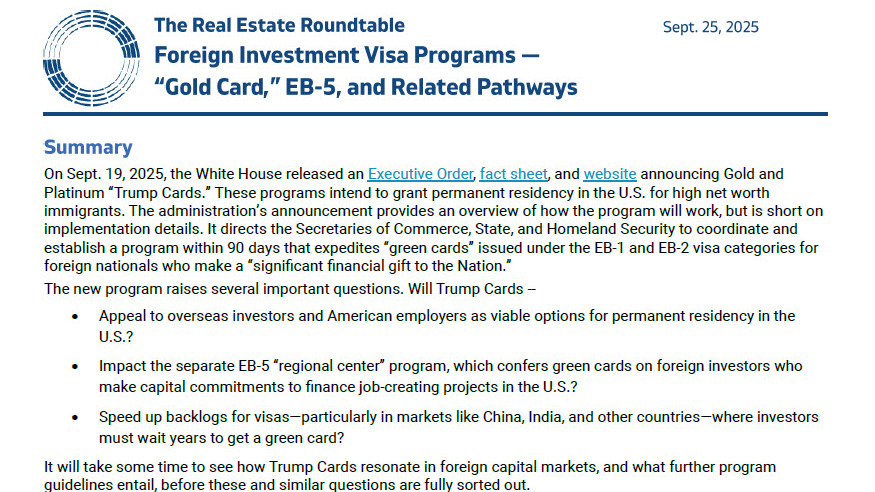
Rep. Lloyd Smucker (R-PA) this week reintroduced the Essential Workers for Economic Advancement Act (H.R. 5494), bipartisan legislation aimed at expanding visa opportunities to address labor shortages in construction, hospitality, and other sectors. (Rep. Smucker Press Release)
Why It Matters
- The Essential Workers bill proposes a new H-2C visa program for critical jobs that do not require a college degree but are essential to business operations and U.S. economic growth. (Coalition Statement, Sept. 17)
- “Job creation and job preparation must go hand-in-hand,” Rep. Smucker said. “Investing in opportunities to strengthen our workforce and grow our economy is a win-win for American workers and businesses.” (Rep. Smucker Press Release)
- There is an estimated shortage of 500,000 construction workers. Without additional labor, efforts to build more housing and address the nation’s affordability crisis will remain stalled. (Associated Builders and Contractors, Jan. 24)
Roundtable View

- The Real Estate Roundtable (RER) commended the legislation.
- “Now that the administration has controlled the emergency at the border, we need to address the nation’s affordable housing emergency—and we must build more supply to get out of it,” said Jeffrey D. DeBoer, RER President and CEO.
- DeBoer continued: “The labor shortage is exacerbating the housing shortage … Congress should develop policies to increase our supply of construction workers so they can build all types of homes in communities across the country. The bipartisan Essential Workers for Economic Advancement Act is exactly the kind of smart response we need.” (Rep. Smucker Press Release, Sept. 23)
- At the recent 2025 C5 + CCIM Global Summit in Chicago, DeBoer also remarked that a targeted construction visa program is essential to expand the labor force and increase housing supply.
- 21 other business groups support the bipartisan Essential Workers bill, including the American Hotel & Lodging Association, Associated General Contractors of America, Business Roundtable, Leading Builders of America, and the National Association of Home Builders.
Trump “Gold Card”

- On Sept. 19, 2025, the White House released an Executive Order, fact sheet, and website announcing Gold and Platinum “Trump Cards.” These programs are intended to grant permanent residency in the U.S. for immigrants with high net worth.
- The Secretaries of Commerce, State, and Homeland Security will coordinate and establish a program within 90 days that expedites “green cards” issued under the EB-1 and EB-2 visa categories for foreign nationals who make a “significant financial gift to the Nation.”
- Gold Card Website: TrumpCard.gov outlines new residency options tied to multimillion-dollar “gifts” to the U.S. to obtain a Gold Card ($1 million), Corporate Gold Card ($2 million), or Platinum Card ($5 million).
- Following the EO’s release, RER developed a fact sheet summarizing what we currently know about the Trump Card program – and how it may interact with the EB-5 “regional center” program, which provides visas for foreign investors in infrastructure, real estate, and other U.S. development projects. (RER Fact Sheet)

- EB-5: The “regional center” program rests on firm statutory foundation through 2027 under the EB-5 Reform and Integrity Act, enacted by Congress in 2022. EB-5 dates back to the 1990s and is the most established investor visa pathway with a proven record of creating jobs for U.S. workers. (Forbes, Sept. 22)
- H-1B changes: The administration also announced that a $100,000 fee would accompany new applications for H-1B visas for highly-skilled workers— intensifying debate between critics who argue foreign workers displace Americans and business leaders who view overseas talent as vital to U.S. competitiveness. (Axios, Sept. 20 | The Hill, Sept. 23)
- At a Sept. 19 press conference, Commerce Secretary Howard Lutnick said the new visa programs and HB-1 fee could raise over $100 billion, which President Donald Trump pledged the government will use toward tax cuts and debt reduction. (Tax Notes, Sept. 23)
RER Advocacy

- In March, RER sent a letter to Sec. Lutnick, endorsing the “Gold Card” proposal, and reiterating the real estate industry’s longstanding support for the EB-5 program. (Roundtable Weekly, March 14)
- As RER’s letter emphasized, the “Gold Card” and EB-5 must work in tandem to achieve multiple objectives: attract top global talent, drive foreign investment to the U.S., and create jobs for American workers. (Letter, March 11)
RER will continue to advocate for common sense immigration policies that prioritize national security while also boosting U.S. economic growth, productivity, and housing supply.

